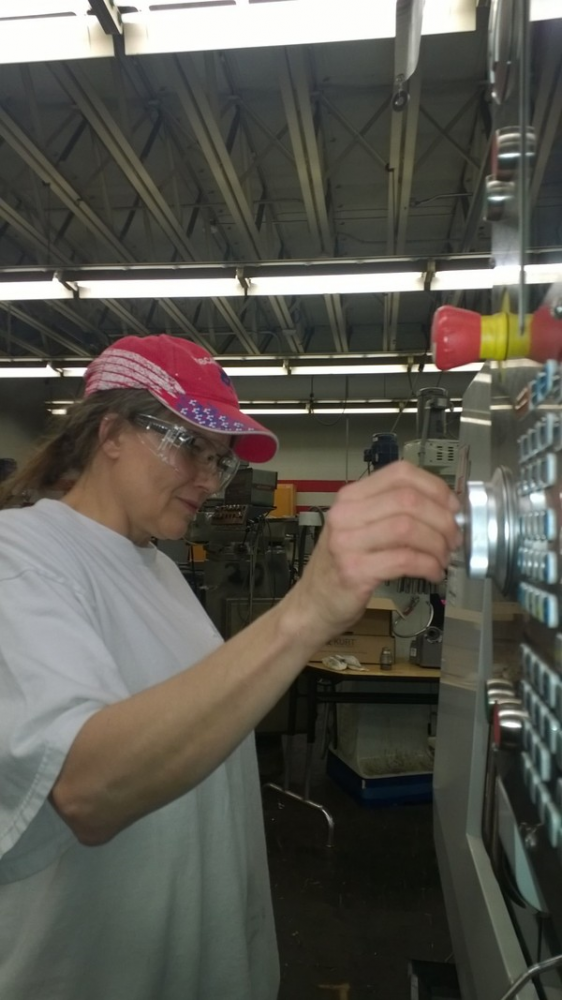November 11, 2016: Tech After Hours Puts Adults on Path to Good Jobs
Employers and potential new hires are speaking the same language when it comes to economic development in Erie: Workers need hands-on training in technical skills and knowledge of soft skills to land a good-paying job.
Thanks to a grant from the Erie County Gaming Revenue Authority and The Erie Community Foundation, Tech After Hours is providing that training to adult students, including Tina Carter, 49. Tina is enrolled in the CNC machining program at Tech After Hours, housed at Central Career and Technical School and made possible by a $400,000 grant—$200,000 from ECGRA and $200,000 from ECF—announced in November 2015.
In addition to machine technology, Tech After Hours offers auto mechanics; culinary arts; construction trades; patient care assistant; and welding. Some students are also able to pursue their high school diplomas if they need four credits or less.
“One of the reasons I returned to school at my age is that I was a stay-at-home mom for the last 10 years, beside a few part-time jobs that didn’t pan out, and I needed a family-sustaining wage,” said Carter, the mother of one teenager and four adult children.
In fact, Carter learned about Tech After Hours when she brought her daughter, Gillian Mae, to an open house at Central. “They should do adult classes,” Carter thought to herself. It turned out adult classes were in the works, and Carter is the one going to Central Tech for three hours every Monday and Wednesday evening. Her daughter is a freshman at Northwest Pennsylvania Collegiate Academy.
Business owners and adult students both say that workers need hands-on training in technical and soft skills to land a good-paying job, and Carter envies one of her classmates, who studied machining in high school and readily masters the hands-on tasks in the classroom.
Yet she isn’t discouraged about what it takes to learn a skilled trade. In May, she graduated with basic skills in machining, but she continues in Tech After Hours because she would like to earn national certification in a number of specific skills. “I wanted to continue to get more advanced skills so I’m actually writing a program,” she said, rather than being a “stand-around, button-pushing operator.”
For a recent three-hour tour at Modern Industries, Tina prepared in advance as if she were going on a lengthy job interview. “Cool,” she thought when she saw the machines set up at Modern Industries, 613 W. 11th St. in Erie. She hopes the tour will help her to land a job at Modern Industries.
In October, Modern Industries, Industrial Sales & Manufacturing, and PHB Inc. began to enroll employees in the machining apprenticeship program at Tech After Hours. “They are training with us while working at their facilities to become master machinists,” said Mathew Pundt, director of career and technical education for Erie’s Public Schools. Six other businesses have expressed interest in partnering with Tech After Hours.
The goals for Tech After Hours align with those spelled out in a Jefferson Educational Society essay, “Erie’s Advanced Industries ,” by Jim Wertz, Ph.D., and Perry Wood, M.S.
Wertz, a professor at Edinboro University of Pennsylvania, and Wood, executive director of the Erie County Gaming Revenue Authority, wrote: … “Erie also needs an educational model that recognizes the importance of both academic achievement and the benefit of skill development. Indeed, many of the lessons young people need to learn do not come from the classroom. So-called ‘soft skills’ are often cited as something learned on the job.”
The essay refers to “young people,” but adult students like Carter need those same skills—and Tech After Hours is making sure they get them.
Donna Bastian works as a welding instructor for Central Career and Technical School and in Tech After Hours. Her adult students are graded on the same scale as her high school students. “You have to have patience” when working with adult students, she said. “They’re sometimes embarrassed to come back to school. We treat them all the same and we let them know they aren’t alone. At the end of the day, they’re all learning something new. The older ones definitely bring more life experience and that’s a good thing,” she said.
“The really unique thing is the very affordable rate (for students) that allows students to graduate from programs with industry credentials,” Pundt said. “You earn that industry credential in jobs aligned to what our needs are in the community,” he said.
At the one-year mark since the Tech After Hours grant was awarded, Pundt said the program is successful. “The candidates come to us with many barriers and the community support services could be stronger for them. Most of the students have a goal to better themselves and a passion for learning. They embrace the program and work hard,” he said. “We just need additional support staff to go out into the community and make community members aware of the opportunity for a free career education with industry credentials.”
Visit www.eriesd.org/adulteducation or call 814-874-6269 to learn about open enrollment, which takes place every month, or to arrange a tour.
By the numbers:
21 - Number of adults in Tech After Hours
18 to 49 - Age range of students
2 - Number of night students attending Tech After Hours, from 5 to 8 p.m. each night.
$4,800 - Normal tuition for Tech After Hours, but most students do not pay any tuition. Their training is funded by the Workforce Innovation and Opportunity Grant program, provided to Erie Public Schools by the U.S. Department of Labor through the Workforce Investment Board. The Gene Haas Foundation, a private foundation in Oxnard, Calif., also provides scholarships. The foundation was started by the owner of HAAS Automation, the leading maker of CNC machines in the U.S. Central Career and Technical School is an authorized HAAS Training Facility with four HAAS mills, four HAAS lathes, and more than 20 manual machines.
17 - Number of Lincoln welding bays
2 - Number of Lincoln Vortex Welding Simulators, paid for by a U.S. Department of Labor grant and by local businesses
5 - Number of Realityworks Welding Simulators, paid for by a federal Carl D. Perkins grant
2 - Number of CNC plasma cutters
In their own words:
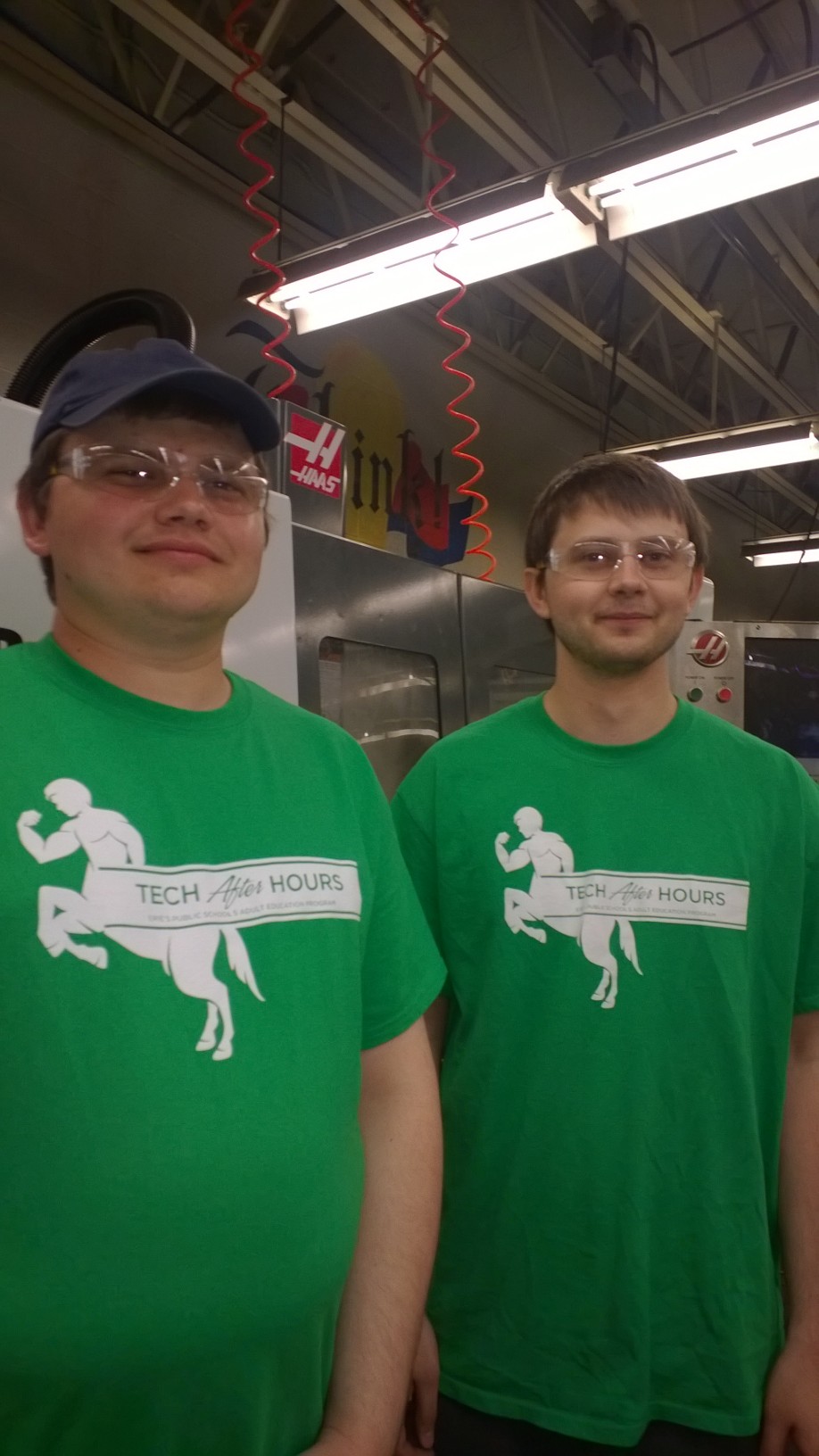 Brothers Vadim Lysychenko, 28, and Yuriy Lysychenko, 24 , are refugees from Ukraine who have been in Erie for about 18 months. Both worked in computer systems in their home country. They worked 10 to 12 hours a day in construction, then took machine technology classes at Tech After Hours twice a week.
Brothers Vadim Lysychenko, 28, and Yuriy Lysychenko, 24 , are refugees from Ukraine who have been in Erie for about 18 months. Both worked in computer systems in their home country. They worked 10 to 12 hours a day in construction, then took machine technology classes at Tech After Hours twice a week.
“Erie needs workers. There are a lot of jobs with CNC (machines),” said Yuriy Lysychenko. “I want to be better at speaking English and to have a profession,” said Vadim Lysychenko. He also wants to dispel a stereotype about newcomers to this country. “Some think immigrants don’t want to work, but Ukrainian guys are working,” he said.
Brothers Vadim, left, and Yuriy Lysychenko, Ukranian refugees,
studied machine technology at Tech After Hours. They also
worked 48 to 50 hours a week doing construction. In addition
to technical skills, they said their adult education classes helped
them with their English skills. They are currently working in
local manufacturing.
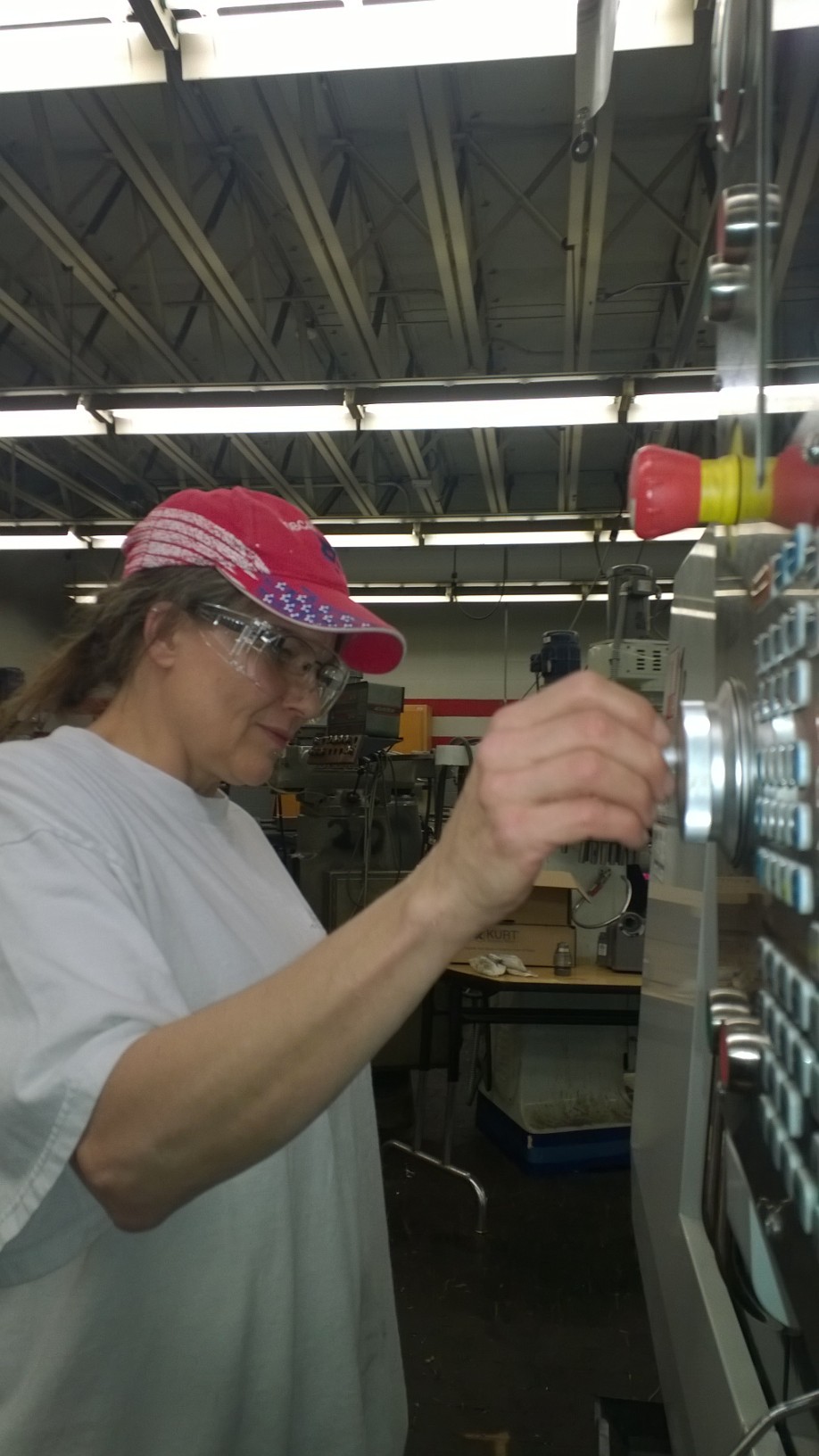 Tina Carter, 49 , chose machine technology because she knows there will be jobs in this field. She has worked in the past as a roofer.
Tina Carter, 49 , chose machine technology because she knows there will be jobs in this field. She has worked in the past as a roofer.
“In the local economy, you can’t make money off flipping burgers,” she said. She learned about Tech After Hours when she attended an open house at Central Career and Technical School with her 14-year-old daughter. “They should do adult classes,” Carter suggested to someone. Then Donna Bastian, welding instructor for daytime and nighttime students, told her about Tech After Hours.
Tina Carter is studying machine technology at Tech
After Hours. "I need to get back into the workforce,"
said Carter, 49, who had been a stay-at-home mom.
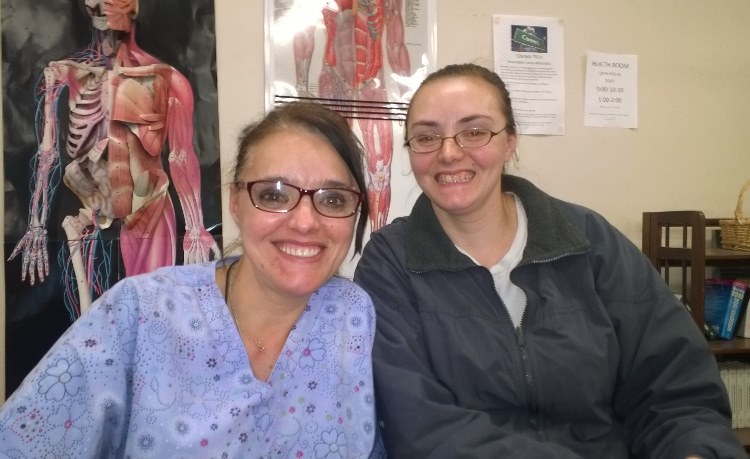 Mother and daughter Karletta Jackson, 50, and Danielle Almeda, 27 , both dropped out of high school. Jackson quit after the 10th grade in Johnstown, Pa., due to bullying that began in kindergarten, she said.
Mother and daughter Karletta Jackson, 50, and Danielle Almeda, 27 , both dropped out of high school. Jackson quit after the 10th grade in Johnstown, Pa., due to bullying that began in kindergarten, she said.
“I couldn’t take it anymore.” Almeda signed herself out of Harbor Creek High School in 10th grade, the day she turned 18. “I didn’t like school,” she said. They both worked in child care during the day and studied for their high school diplomas and to become patient care assistants at Tech After Hours. “We are just supportive of each other,” said Jackson.
Mother and daughter Karletta Jackson, left, and Danielle Almeda worked on their high
school diplomas and studied to become patient care assistants at Tech After Hours.
After completing the program, both received job offers in Erie but took jobs as patient
care assistants in Georgia, for family reasons.
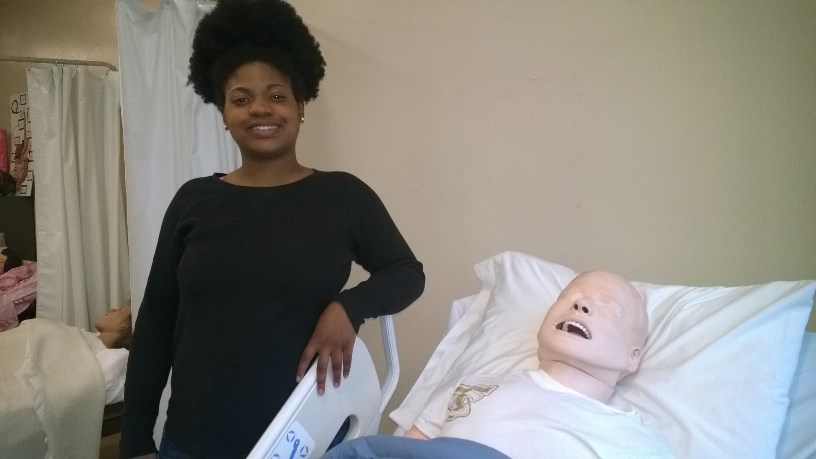 Jamyra Miller, 21, took classes to become a patient care assistant in Tech After Hours.
Jamyra Miller, 21, took classes to become a patient care assistant in Tech After Hours.
"We add two or three more skills to every class," she said as she prepared to show how she and her classmates used a mannequin to practice what they learn. She has been placed as a patient care assistant in Pittsburgh.

